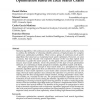1103 search results - page 218 / 221 » Evolutionary Design Calibration |
123
Voted
CORR
2008
Springer
15 years 2 months ago
2008
Springer
Scheduling problems are generally NP-hard combinatorial problems, and a lot of research has been done to solve these problems heuristically. However, most of the previous approach...
131
click to vote
EC
2010
15 years 2 months ago
2010
Memetic algorithms with continuous local search methods have arisen as effective tools to address the difficulty of obtaining reliable solutions of high precision for complex cont...
125
Voted
GPEM
2008
15 years 2 months ago
2008
In this work a cooperative, bid-based, model for problem decomposition is proposed with application to discrete action domains such as classification. This represents a significan...
139
Voted
BMCBI
2006
15 years 2 months ago
2006
Background: In recent times, there has been an exponential rise in the number of protein structures in databases e.g. PDB. So, design of fast algorithms capable of querying such d...
121
Voted
BMCBI
2007
15 years 2 months ago
2007
Background: The pyridine nucleotide disulfide reductase (PNDR) is a large and heterogeneous protein family divided into two classes (I and II), which reflect the divergent evoluti...


